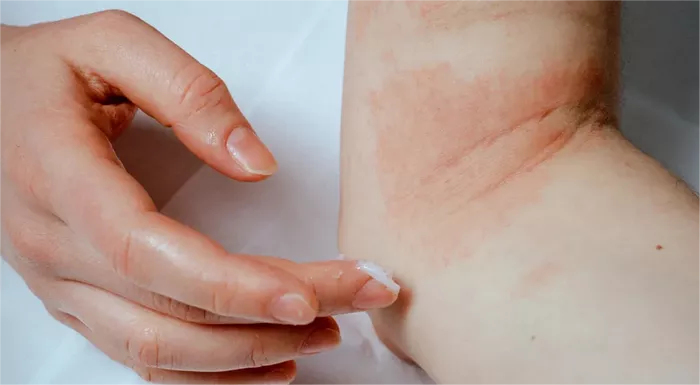Eczema is a common skin condition that causes inflammation, redness, and itching. While topical treatments like creams and ointments are frequently used to manage the symptoms, healing eczema from the inside out can often lead to better, long-term results. This approach focuses on addressing the root causes of eczema, which may include internal factors like diet, stress, and immune system function. In this article, we will explore several natural and practical ways to heal eczema from within, promoting overall skin health and balance.
Understand the Root Causes of Eczema
Eczema is a complex condition, and its exact cause can vary from person to person. However, it is generally believed that eczema results from a combination of genetic and environmental factors that trigger an overreaction of the immune system. Some common internal triggers include:
Immune System Dysregulation: Eczema is often linked to an overactive immune response, where the body’s immune system mistakes harmless substances for threats, triggering inflammation in the skin.
Inflammation: Chronic inflammation is a major contributor to eczema. This can stem from systemic issues like poor digestion, high stress levels, and diet-related imbalances.
Leaky Gut Syndrome: An unhealthy gut can contribute to skin conditions like eczema. If your gut lining is damaged or compromised, it can lead to the release of toxins into your bloodstream, potentially triggering inflammation in the skin.
Genetics: Family history plays a significant role in the development of eczema. If you have a parent or sibling with eczema, asthma, or allergies, you may be more prone to developing eczema.
Food Sensitivities and Allergies: Certain foods, such as dairy, gluten, or nuts, may trigger eczema flare-ups in some individuals.
Adopt an Anti-Inflammatory Diet
One of the most effective ways to heal eczema from the inside out is by adopting an anti-inflammatory diet. Foods that promote inflammation can worsen eczema symptoms, while foods that reduce inflammation can support skin health and reduce flare-ups.
Foods to Include
Omega-3 Fatty Acids: These healthy fats are powerful anti-inflammatory agents. They can help reduce the inflammation that contributes to eczema flare-ups. Include sources like fatty fish (salmon, mackerel), flaxseeds, chia seeds, and walnuts in your diet.
Fruits and Vegetables: A diet rich in colorful fruits and vegetables provides a variety of antioxidants, vitamins, and minerals that support immune function and skin health. Focus on foods like berries, leafy greens, sweet potatoes, and bell peppers.
Probiotics: Gut health plays a key role in managing eczema, and probiotics help maintain a healthy balance of bacteria in the gut. Include fermented foods such as yogurt, kefir, sauerkraut, kimchi, and kombucha to support your digestive system.
Bone Broth: Bone broth is rich in collagen and amino acids, which help support skin health and repair damaged tissue. Drinking bone broth regularly may help to reduce inflammation in the skin and promote healing.
Healthy Fats: Healthy fats like avocado, olive oil, and coconut oil help keep your skin hydrated and reduce inflammation. These fats also play a role in maintaining the integrity of your skin’s barrier function.
Foods to Avoid
Processed Foods and Refined Sugar: These foods can trigger inflammation and worsen eczema. High sugar levels can also lead to blood sugar spikes, which can further exacerbate inflammation in the body.
Dairy and Gluten: If you have sensitivities to dairy or gluten, consuming these products can worsen eczema symptoms. Some individuals find relief by eliminating these foods from their diet, so it may be worth testing whether cutting them out improves your skin health.
Food Allergens: Common food allergens like peanuts, eggs, and soy can trigger eczema flare-ups in some people. Consider an elimination diet to identify any potential food triggers.
Focus on Gut Health
Gut health is crucial for overall health, and it plays a significant role in the management of eczema. A healthy gut helps regulate the immune system and manage inflammation. To improve your gut health and support eczema healing:
Increase Fiber Intake: Fiber-rich foods like fruits, vegetables, legumes, and whole grains help maintain healthy digestion. Fiber supports the growth of beneficial bacteria in the gut, which in turn strengthens the immune system and reduces inflammation.
Take Probiotics: As mentioned earlier, probiotics can help balance gut bacteria and improve digestive function. Probiotics have been shown to reduce inflammation and may even help regulate the immune system in people with eczema.
Stay Hydrated: Drinking enough water is essential for overall health and can improve digestion. Dehydration can lead to dry skin, which can trigger eczema flare-ups.
Consider Bone Broth or Collagen Supplements: Bone broth contains gelatin and collagen, which help heal the gut lining. These nutrients can also support skin repair. Collagen supplements, taken in powdered form, can also promote skin elasticity and hydration.
Manage Stress Effectively
Stress is a well-known trigger for eczema flare-ups. When you are stressed, your body produces cortisol, a hormone that can increase inflammation in the body and worsen eczema symptoms. Managing stress is crucial for healing eczema from the inside out.
Effective Stress Management Techniques
Mindfulness and Meditation: Mindfulness practices, such as deep breathing, meditation, or yoga, can help reduce stress and promote relaxation. These practices can lower cortisol levels and help you manage eczema flare-ups more effectively.
Regular Exercise: Exercise is a great way to reduce stress and improve overall health. It helps reduce cortisol levels, promotes better sleep, and improves blood circulation, which can benefit skin health. Be mindful to avoid overheating or sweating too much during exercise, as this can irritate the skin.
Adequate Sleep: Chronic sleep deprivation can increase stress levels and inflammation in the body. Ensure you get enough sleep each night—ideally 7-9 hours—to help regulate your immune system and support healing.
Relaxation Techniques: Engaging in hobbies that relax you, such as reading, listening to music, or spending time in nature, can help lower stress levels and reduce the risk of eczema flare-ups.
Boost Your Immune System
A strong immune system is essential for fighting inflammation and supporting overall skin health. Certain lifestyle changes can help boost immune function and reduce the likelihood of eczema flare-ups.
How to Strengthen Your Immune System
Vitamin D: Vitamin D plays a vital role in immune function and skin health. Deficiency in vitamin D has been linked to an increased risk of eczema. Spend time outdoors in the sunlight, and consider taking a vitamin D supplement if you have low levels.
Zinc and Vitamin C: Zinc supports skin repair and immune function, while vitamin C is an antioxidant that reduces inflammation. Include zinc-rich foods like pumpkin seeds, chickpeas, and lentils, as well as vitamin C-rich foods like citrus fruits, strawberries, and bell peppers in your diet.
Herbal Supplements: Some herbs, such as turmeric and ginger, are known for their anti-inflammatory properties. Consider adding these to your diet or using them as supplements to support immune function and reduce skin inflammation.
Stay Hydrated
Hydration is key to maintaining healthy skin, especially when dealing with eczema. Dehydration can cause the skin to become dry and cracked, making it more susceptible to irritation and flare-ups. Drinking enough water helps keep your skin moisturized from the inside, and it supports overall bodily functions, including digestion and immune function.
Aim to drink at least 8 glasses of water per day. You can also include hydrating foods like cucumbers, watermelon, and leafy greens in your diet.
Consider Natural Supplements
In addition to dietary changes, certain natural supplements can help support skin health and reduce inflammation. Some popular supplements for eczema include:
Fish Oil: Rich in omega-3 fatty acids, fish oil can help reduce inflammation and promote skin healing.
Probiotic Supplements: If you have trouble getting enough probiotics from food, consider taking a supplement to support gut health.
Evening Primrose Oil: This oil contains gamma-linolenic acid (GLA), an essential fatty acid that can help reduce inflammation and support skin hydration.
Vitamin E: Vitamin E is an antioxidant that helps protect the skin from damage and supports healing. It can be taken as a supplement or applied topically to eczema-prone areas.
Final Thoughts
Healing eczema from the inside out is a holistic approach that addresses the underlying causes of the condition. By focusing on a balanced, anti-inflammatory diet, managing stress, improving gut health, and supporting your immune system, you can reduce eczema flare-ups and improve your skin health. Remember that healing takes time, and consistency is key. With patience and the right lifestyle changes, it is possible to manage eczema and enjoy healthier, more comfortable skin.
Related topics


























